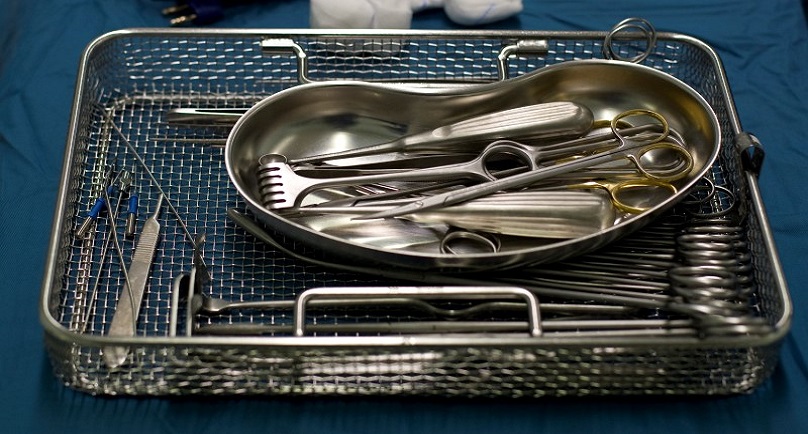Image: Surgery instruments are pictured during procedures to clean the wound of an amputee patient with MRSA (Methicillin resistant Staphylococcus Aureus) in the operating theatre at the Unfallkrankenhaus Berlin (UKB) hospital in Berlin February 29, 2008. REUTERS/Fabrizio Bensch
By Kathryn Doyle
(Reuters Health) – Women surgeons working at university medical centers say they’ve faced more gender discrimination as staff surgeons than they did as medical students or residents, according to a new study in Canada.
But the women surgeons still rated their career satisfaction highly, researchers found.
“As a woman in surgery, and someone interested in gender issues, I don’t find the results of this study are surprising, but perhaps disappointing,” said lead author Dr. Natashia M. Seemann of the University of Toronto.
Surgery generally is a challenging career, and so-called academic surgery (i.e., at university hospitals) carries specific pressures and expectations, she told Reuters Health by email.
“For example, many academic surgeons are expected to reach a certain research productivity yearly, and have teaching and administrative responsibilities” on top of their duties as a surgeon, Seemann said.
Even in non-surgical specialties where more than half the faculty is female, like pediatrics, women are not represented proportionately in leadership positions, she said.
Though the number of women in surgery is steadily increasing, they still account for only 22 percent of full-time faculty and 1 percent of chairs of surgery.
Seemann and her colleagues invited 212 women in academic surgery at Canadian medical centers to answer a 48-question online survey. Of the 81 who responded, almost half were assistant professors – a relatively junior position.
Respondents reported working between 40 and 100 hours per week.
More than half of the women said their gender had played a role in career challenges, and while some had experienced gender discrimination in medical school, residency or fellowship, the highest percentage, 41 percent, said they experienced this discrimination as full-fledged staff surgeons.
Gender discrimination in today’s surgical world is subtle, Seemann said. “Female medical students are told much more often than male medical students to consider a career other than surgery because it’s not compatible with family life,” she said.
“A female surgical resident will be mistaken for a nurse repeatedly by other staff in the hospitals, and the patient she just introduced herself to as ‘Doctor’ will go on to speak directly to the male medical student working with her,” Seemann said. “The issue with this type of gender discrimination is that it’s not ‘big or bad enough’ to report, and rather in some cases it slowly chips away at the self-esteem and confidence of extremely intelligent and hard-working women.”
Almost 80 percent of respondents said they had a professional mentor, almost 90 percent of whom were male. About half wished they had had better mentoring, and many would have liked female mentors.
“Mentorship is an area that we know is extremely important to the success of academic surgeons, and having more women, and men supportive of women, in these roles will help more women surgeons advance,” Seemann said.
Despite these factors, the women rated their career satisfaction at an average of 8.6 on a scale of 1 to 10.
“Lack of support for working women, especially when rising into leadership positions, is evident in many places in society,” said Dr. Paula Ferrada, director of the Surgical Critical Care Fellowship at Virginia Commonwealth University, who was not part of the new study.
In the U.S. and Canada, there are safeguards built into medical school and residency programs that fall away in the “real world” for working surgeons, Ferrada told Reuters Health by phone.
“The gender imbalance in surgery, particularly at the leadership level, has allowed a dated culture to exist far longer than it should – one that favors confidence over competence, quick decisions over good decisions, and an unsustainable work-life balance,” Seemann said.
The survey respondents said flexible work hours, reduced workload and more equitable relationships with colleagues would influence more women to become surgeons, the researchers reported in the American Journal of Surgery.
“(Academic surgery) is still a bastion of masculinity, and also the best paid of specialties,” said Patrizia Longo of the Women’s and Gender Studies department of Saint Mary’s College of California in Moraga.
Ferrada advises young surgeons, male or female, to seek out mentors who can give advice and point out opportunities. “Find someone who is doing what you want to do and ask them what they wish they knew earlier,” she said.
SOURCE: http://bit.ly/1OkeAIP The American Journal of Surgery, online November 17, 2015.
Copyright 2015 Thomson Reuters. Click for Restrictions.


